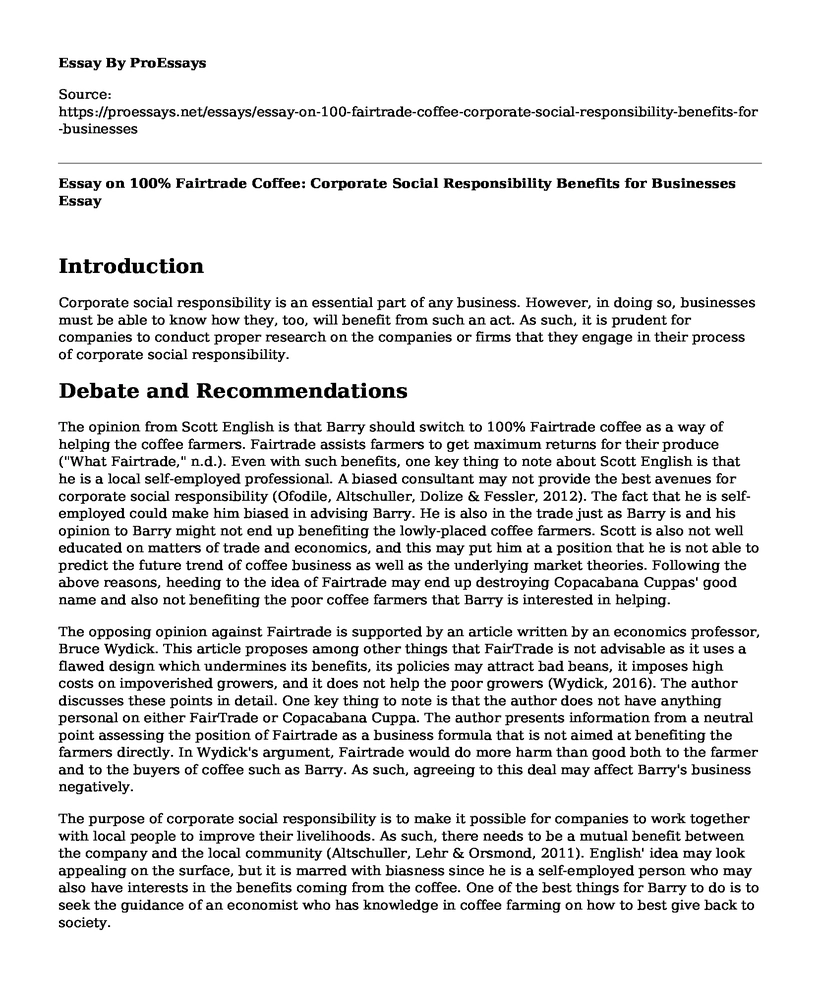Introduction
Corporate social responsibility is an essential part of any business. However, in doing so, businesses must be able to know how they, too, will benefit from such an act. As such, it is prudent for companies to conduct proper research on the companies or firms that they engage in their process of corporate social responsibility.
Debate and Recommendations
The opinion from Scott English is that Barry should switch to 100% Fairtrade coffee as a way of helping the coffee farmers. Fairtrade assists farmers to get maximum returns for their produce ("What Fairtrade," n.d.). Even with such benefits, one key thing to note about Scott English is that he is a local self-employed professional. A biased consultant may not provide the best avenues for corporate social responsibility (Ofodile, Altschuller, Dolize & Fessler, 2012). The fact that he is self-employed could make him biased in advising Barry. He is also in the trade just as Barry is and his opinion to Barry might not end up benefiting the lowly-placed coffee farmers. Scott is also not well educated on matters of trade and economics, and this may put him at a position that he is not able to predict the future trend of coffee business as well as the underlying market theories. Following the above reasons, heeding to the idea of Fairtrade may end up destroying Copacabana Cuppas' good name and also not benefiting the poor coffee farmers that Barry is interested in helping.
The opposing opinion against Fairtrade is supported by an article written by an economics professor, Bruce Wydick. This article proposes among other things that FairTrade is not advisable as it uses a flawed design which undermines its benefits, its policies may attract bad beans, it imposes high costs on impoverished growers, and it does not help the poor growers (Wydick, 2016). The author discusses these points in detail. One key thing to note is that the author does not have anything personal on either FairTrade or Copacabana Cuppa. The author presents information from a neutral point assessing the position of Fairtrade as a business formula that is not aimed at benefiting the farmers directly. In Wydick's argument, Fairtrade would do more harm than good both to the farmer and to the buyers of coffee such as Barry. As such, agreeing to this deal may affect Barry's business negatively.
The purpose of corporate social responsibility is to make it possible for companies to work together with local people to improve their livelihoods. As such, there needs to be a mutual benefit between the company and the local community (Altschuller, Lehr & Orsmond, 2011). English' idea may look appealing on the surface, but it is marred with biasness since he is a self-employed person who may also have interests in the benefits coming from the coffee. One of the best things for Barry to do is to seek the guidance of an economist who has knowledge in coffee farming on how to best give back to society.
Conclusion
Based on the above assessment of both sides, it is recommended that Barry refuses to engage in the Fairtrade deal as it is likely to affect his business negatively. The major intention of Barry is to assist the poor coffee farmers. However, as Wydick suggests, Fairtrade will not fulfill this promise. The major reason for this is that it imposes significant costs on impoverished growers. As such, Barry needs to find other means of assisting the farmers other than recruiting the services of a partisan entity such as Scott English.
References
Altschuller, S., Lehr, A., & Orsmond, A. (2011). Corporate Social Responsibility. The International Lawyer, 45(1), 179-189. Retrieved from http://www.jstor.org/stable/23644007
Ofodile, U., Altschuller, S., Dolize, A., & Fessler, M. (2012). Corporate Social Responsibility. The International Lawyer, 46(1), 181-197. Retrieved from http://www.jstor.org/stable/23827359
What Fairtrade Does (n.d). Fairtrade Australia. Retrieved from: http://fairtrade.com.au/What-is-Fairtrade/What-Fairtrade-does
Wydick, Bruce (2016). 10 reasons fair-trade coffee doesn't work. Huffpost. Retrieved from: https://www.huffpost.com/entry/10-reasons-fair-trade-coffee-doesnt-work_b_5651663?guccounter=2
Cite this page
Essay on 100% Fairtrade Coffee: Corporate Social Responsibility Benefits for Businesses. (2023, Feb 11). Retrieved from https://proessays.net/essays/essay-on-100-fairtrade-coffee-corporate-social-responsibility-benefits-for-businesses
If you are the original author of this essay and no longer wish to have it published on the ProEssays website, please click below to request its removal:
- Article Review: Developing a Spiritual Assessment Toolbox
- Careers in Sociology Essay Example
- Application for Full Prescriptive Authority
- Job Overview of Global Project Manager Paper Example
- Paper Example on Exploring Subway's Value Chain: SWOT Analysis
- Essay Example on Developing a Diversity Training Plan: Strategies and Implementation
- Essay Example on Zappos: Outstanding Customer Service & Data-Driven Performance







